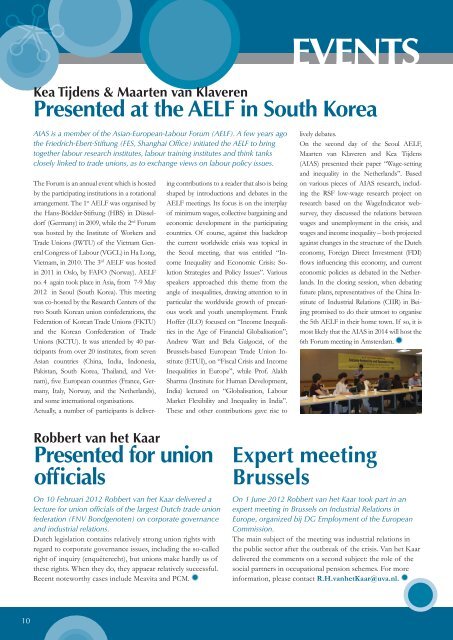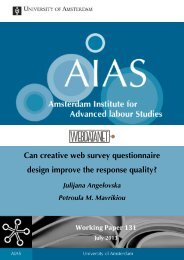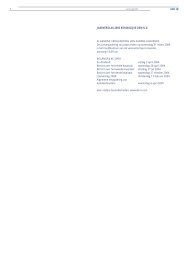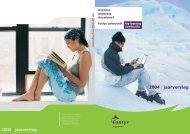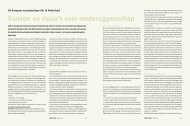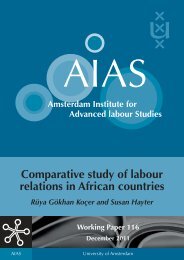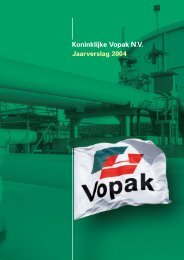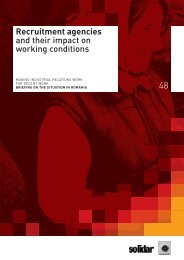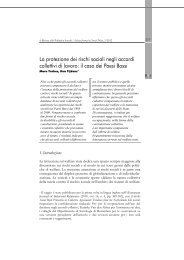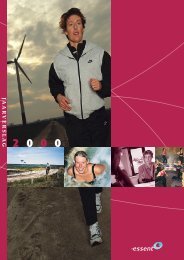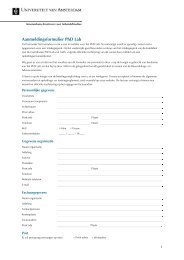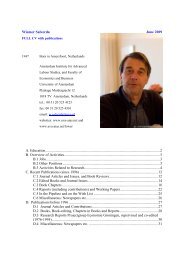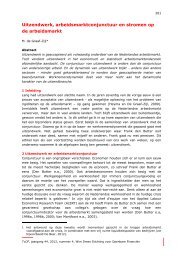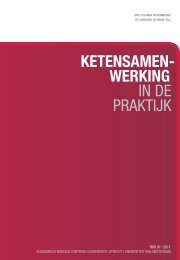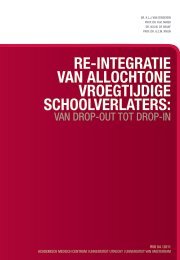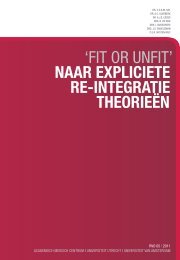AIAS newsletter Autumn 2012 TW.indd
AIAS newsletter Autumn 2012 TW.indd
AIAS newsletter Autumn 2012 TW.indd
You also want an ePaper? Increase the reach of your titles
YUMPU automatically turns print PDFs into web optimized ePapers that Google loves.
10<br />
Kea Tijdens & Maarten van Klaveren<br />
EVENTS<br />
Presented at the AELF in South Korea<br />
<strong>AIAS</strong> is a member of the Asian-European-Labour Forum (AELF). A few years ago<br />
the Friedrich-Ebert-Stiftung (FES, Shanghai Offi ce) initiated the AELF to bring<br />
together labour research institutes, labour training institutes and think tanks<br />
closely linked to trade unions, as to exchange views on labour policy issues.<br />
The Forum is an annual event which is hosted<br />
by the participating institutions in a rotational<br />
arrangement. The 1 st AELF was organised by<br />
the Hans-Böckler-Stiftung (HBS) in Düsseldorf<br />
(Germany) in 2009, while the 2 nd Forum<br />
was hosted by the Institute of Workers and<br />
Trade Unions (IWTU) of the Vietnam General<br />
Congress of Labour (VGCL) in Ha Long,<br />
Vietnam, in 2010. The 3 rd AELF was hosted<br />
in 2011 in Oslo, by FAFO (Norway). AELF<br />
no. 4 again took place in Asia, from 7-9 May<br />
<strong>2012</strong> in Seoul (South Korea). This meeting<br />
was co-hosted by the Research Centers of the<br />
two South Korean union confederations, the<br />
Federation of Korean Trade Unions (FKTU)<br />
and the Korean Confederation of Trade<br />
Unions (KCTU). It was attended by 40 participants<br />
from over 20 institutes, from seven<br />
Asian countries (China, India, Indonesia,<br />
Pakistan, South Korea, Thailand, and Vetnam),<br />
fi ve European countries (France, Germany,<br />
Italy, Norway, and the Netherlands),<br />
and some international organisations.<br />
Actually, a number of participants is deliver-<br />
Robbert van het Kaar<br />
Presented for union<br />
offi cials<br />
On 10 Februari <strong>2012</strong> Robbert van het Kaar delivered a<br />
lecture for union offi cials of the largest Dutch trade union<br />
federation (FNV Bondgenoten) on corporate governance<br />
and industrial relations.<br />
Dutch legislation contains relatively strong union rights with<br />
regard to corporate governance issues, including the so-called<br />
right of inquiry (enquêterecht), but unions make hardly us of<br />
these rights. When they do, they appaear relatively successful.<br />
Recent noteworthy cases include Meavita and PCM.<br />
ing contributions to a reader that also is being<br />
shaped by introductions and debates in the<br />
AELF meetings. Its focus is on the interplay<br />
of minimum wages, collective bargaining and<br />
economic development in the participating<br />
countries. Of course, against this backdrop<br />
the current worldwide crisis was topical in<br />
the Seoul meeting, that was entitled “Income<br />
Inequality and Economic Crisis: Solution<br />
Strategies and Policy Issues”. Various<br />
speakers approached this theme from the<br />
angle of inequalities, drawing attention to in<br />
particular the worldwide growth of precarious<br />
work and youth unemployment. Frank<br />
Hoffer (ILO) focused on “Income Inequalities<br />
in the Age of Financial Globalisation”;<br />
Andrew Watt and Bela Galgoczi, of the<br />
Brussels-based European Trade Union Institute<br />
(ETUI), on “Fiscal Crisis and Income<br />
Inequalities in Europe”, while Prof. Alakh<br />
Sharma (Institute for Human Development,<br />
India) lectured on “Globalisation, Labour<br />
Market Flexibility and Inequality in India”.<br />
These and other contributions gave rise to<br />
lively debates.<br />
On the second day of the Seoul AELF,<br />
Maarten van Klaveren and Kea Tijdens<br />
(<strong>AIAS</strong>) presented their paper “Wage-setting<br />
and inequality in the Netherlands”. Based<br />
on various pieces of <strong>AIAS</strong> research, including<br />
the RSF low-wage research project on<br />
research based on the WageIndicator websurvey,<br />
they discussed the relations between<br />
wages and unemployment in the crisis, and<br />
wages and income inequality – both projected<br />
against changes in the structure of the Dutch<br />
economy, Foreign Direct Investment (FDI)<br />
fl ows infl uencing this economy, and current<br />
economic policies as debated in the Netherlands.<br />
In the closing session, when debating<br />
future plans, representatives of the China Institute<br />
of Industrial Relations (CIIR) in Beijing<br />
promised to do their utmost to organise<br />
the 5th AELF in their home town. If so, it is<br />
most likely that the <strong>AIAS</strong> in 2014 will host the<br />
6th Forum meeting in Amsterdam.<br />
Expert meeting<br />
Brussels<br />
On 1 June <strong>2012</strong> Robbert van het Kaar took part in an<br />
expert meeting in Brussels on Industrial Relations in<br />
Europe, organized bij DG Employment of the European<br />
Commission.<br />
The main subject of the meeting was industrial relations in<br />
the public sector after the outbreak of the crisis. Van het Kaar<br />
delivered the comments on a second subject: the role of the<br />
social partners in occupational pension schemes. For more<br />
information, please contact R.H.vanhetKaar@uva.nl.


